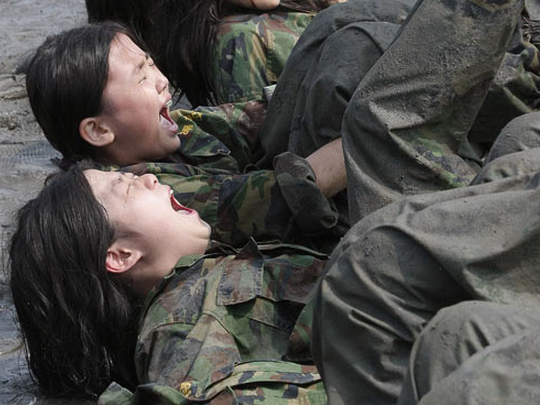Is haebyungdae necessary for children?

According to the Gyeonggido Office of Education, 119,598 students have been sent to military camps over the past six years. Last year alone, 107 schools sent their students to teach them how to strengthen their mind. At the camps, instructors push the students to their mental limits by giving them physically demanding drills. As if they were in the military, instructors demand students to act in unison; if one student makes a mistake, the whole class receives collective punishment. By going through such extreme physical exercises, students are expected to learn discipline and to overcome their weak mentalities.
Contrary to the original intentions, however, the experience of military life brings more harm than benefit to the students. First of all, while military life teaches hierarchy, uniformity and discipline, student life teaches passion, creativity and collaboration. Students do not need to be disciplined in the same way that soldiers are. The type of discipline they need is different as their main responsibility lies in becoming part of the society and contributing to its growth and prosperity. They need discipline in the sense that they need to obey the law and follow the rules within the society, but not to blindly follow all orders given by a senior. Also, excessive discipline learned from military experience leads to uniformity. Uniformity among students, however, does not lead to the creativity and passion that children and teenagers need to develop. Creativity is important because it allows people to find novel solutions to existing problems by thinking outside the box. Passion is also essential as it motivates people to achieve their goals as German philosopher Hegel once said: “Nothing great in the world has ever been accomplished without passion.”
What is more, sending students to military camps is not an effective way to teach them to overcome their weakness at their own will. Military camps aim to encourage students to reflect on their lifeand learn to be thankful with what they have through extreme exercises. This goal, however, cannot be realized if students are overwhelmed by the atmosphere of fear that military camps create. When students fail to follow commands, they become subject to harsh punishments. Although not necessarily violent, these punishments involve physically demanding drills. Forced to carry out these drills, the students are terrorized. Although they may learn discipline, the lessons they learn and how they are taught are far from what they need as young students.
* * *
Elementary, middle and high school students are still growing children and teenagers that need to be protected by our society. Extreme exercises and physically demanding drills should not be forced upon the youth in the name of discipline. Students do need to learn to overcome their weaknesses but this should not be forced upon them. They should be given an opportunity to learn in an open environment that fuels creativity and passion not fear.

